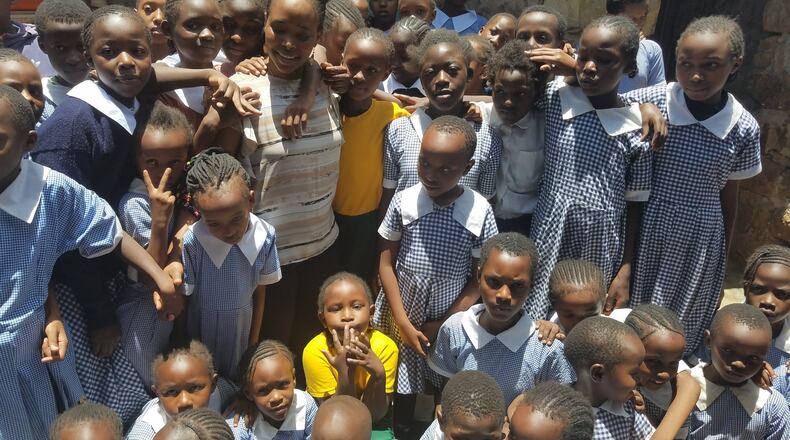Grace Nkundabantu says she still remembers the banging on the door.
It was 1996 and her country, the Democratic Republic of Congo, was embroiled in a devastating civil war that would claim thousands of lives and displace millions more.
“You have to go,” the man on the other side of the door told her father, a Christian missionary and a Tutsi in a region dominated by other Congolese tribes. “They are coming to burn your house down.”
Nkundabantu’s father gathered his wife and five children and fled their Kinshasa home. They spent the next six years on the run living in refugee camps. First across the border to the Congo. Then to Rwanda. Then to Burundi, before settling in Nairobi, Kenya in 2002.
“We had to leave with nothing. It was a very confusing and traumatic situation,” Nkundabantu said. “I knew I was Congolese, so I could not understand why we were being forced to leave. We had limited food and no clean water. No clothing to change. No shoes. I can still remember the images of what was going on.”
She moved to the United States in 2008 under a United Nations High Commissioner for Refugees resettlement program for refugees.
But she says those earlier images flush back, sometimes in tears, when she looks into the eyes of her girls – all 120 of them.
Last year Nkundabantu started the African Girls Hope Foundation to address the needs of orphaned girls from East and Central Africa who have been devastated by poverty, wars, abuse, and diseases.
On Saturday, Nkundabantu will host a fund-raising gala in Marietta to raise as much as $35,000 in scholarship money to send all of the 120 girls to school.
One hundred of those girls, ranging in age from 6 to 19 years old, are from the Democratic Republic of the Congo. Another 20 are living in refugee camps in Kenya. They were all identified by school directors in their villages as having lost both their parents, according to Nkundabantu.
“I cry all the time when I am with them,” Nkundabantu said. “My hope is I am able to get the funds and cover all of their educations.”
Thirty-two of the girls have already had their primary or high school educations partially funded by Nkundabantu.
In August, the United Nations Children’s Fund, UNICEF, reported that more than 1,300 children have been orphaned as a result of the Ebola outbreak alone in the Democratic Republic of Congo, and more than 2,400 separated from their parents or caregivers since the outbreak was declared in August 2018.
Ethnic fighting is still ongoing in parts of the country and the United Nations refugee agency, UNHCR, estimates close to 4.5 million people have been internally displaced, the highest number in the whole continent.
Dede Ntumba, president of the Congolese Community of Atlanta, said the violence remains unthinkable, to the point where the “raping of women and the raping of children is used as a weapon of war.”
There are roughly 7,000 members of the Congolese community living in the Atlanta area, mostly in Clarkston.
The Trump administration has been reducing sharply the number of refugees allowed to settle in the U.S. In September, the federal government announced plans to cut the number from 30,000 this year to 18,000 in 2020. The previous Obama administration, by contrast, set a goal of 110,000 seeking safe haven for the 2017 fiscal year.
Nearly 40% of Congolese living in Atlanta, according to Ntumba, are refugees who escaped the civil war. More than 500 refugees from the Democratic Republic of Congo arrived in Atlanta this year.
“There is a concern here and in the camps because a lot of (Congolese refugees) have hoped to join family in America and get stuck in these camps under this policy,” Ntumba said.
Of the world’s 28 poorest countries, 27 are in sub-Saharan Africa, all with poverty rates above 30%.
All of that spills over into education. More than one-fifth of children between the ages of 6 and 11 in the region are out of school, as well as one-third of youth between the ages of 12 and 14, according to a recent report by UNESCO, another U.N. agency.
The data are even more troubling for females. Across the region, 9 million girls between the ages of 6 and 11 will never go to school, compared with 6 million boys, according to UNESCO.
Nkundabantu, whose name means “love for people,” was one of the lucky ones.
By the time her family arrived in Kenya in 2002, she had spent years without a formal education.
“In Nairobi, I understood the pain of not being in school,” she said.
One day in 2006, while she was singing as part of a worship and praise group, things suddenly changed. A group of visiting Americans were so moved by her performance that on the spot, they paid for her education, including her tuition to Daystar University, a Christian school in Nairobi, where she completed her bachelor’s degree.
Now 36, she eventually got a master's degree in organizational management at Ashford University in 2014 and is wrapping up a doctorate at Walden University in human and social services. She works for Samaritan's Purse International Relief, a Christian charity, in Boone, North Carolina.
“When I arrived here, the image and the promise of arriving in this country was like a dream come true,” she said. “And I promised that I would do something for my fellow girls. By God’s grace.”
The African Girls Hope Foundation’s gala dinner will be held at 7 p.m. Saturday at the Kenyan American Community Church, 771 Elberta Dr., Marietta.
About the Author
The Latest
Featured




